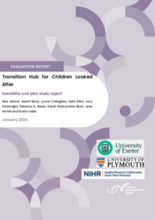The Transition Hub aims to support young people aged 11 to 17 who are making the transition into care or experiencing a placement transition.
It does this through a multi-disciplinary team which provides support to young people, their carers and schools. Developed by Dr Catherine Carroll, working in collaboration with Achieving for Children and Barnet Local Authority, the Transition Hub aims to support the social and academic development of young people. Depending on the young person’s situation, either they receive ‘inreach’ support delivered in a physical hub for up to six weeks followed by five months of ‘outreach’ support, or they receive six months of outreach support only (provided in a young person’s school).
Inreach support provides daily lessons, 9 am to 3 pm, Monday to Friday, that focus on academic skills, pre-learning on topics the young people will be studying in their school, social-emotional development and enrichment activities. Inreach is delivered in a physical hub located at a nearby school for the young people who gradually transition into their own school as the project progresses. In outreach support, young people receive six weekly in-school meetings with a learning mentor who supports them with a range of issues, including attendance, core curriculum subjects, homework, friendships and extra-curricular activities.
Following the first six weeks, they receive four monthly meetings (unless the young person requires additional support). School staff and young people’s carers also receive support and training to support the transitions. The programme is delivered by multiple staff, including lead teachers, learning mentors and an educational psychologist.
YEF funded a feasibility and pilot evaluation of the Transition Hub. The feasibility phase explored the feasibility of delivery and aimed to provide lessons for further research. The pilot phase examined whether the Transition Hub might evidence promise on desired outcomes and sought to offer further learning about delivery and acceptability. Across the two phases, 80 young people were supported by the Transition Hub. Qualitative methods used to evaluate the programme included semi-structured interviews with young people, foster carers, Transition Hub staff and other stakeholders.
The evaluator also analysed data routinely collected by the Transition Hubs, including delivery monitoring data, school attendance data and data from the Strengths and Difficulties Questionnaire (SDQ) and Pupil Attitude to Self and School (PASS) survey. Delivered from January 2020 to December 2022, the study was undertaken during the coronavirus pandemic, requiring the delivery and evaluation teams to adapt to challenging circumstances.

